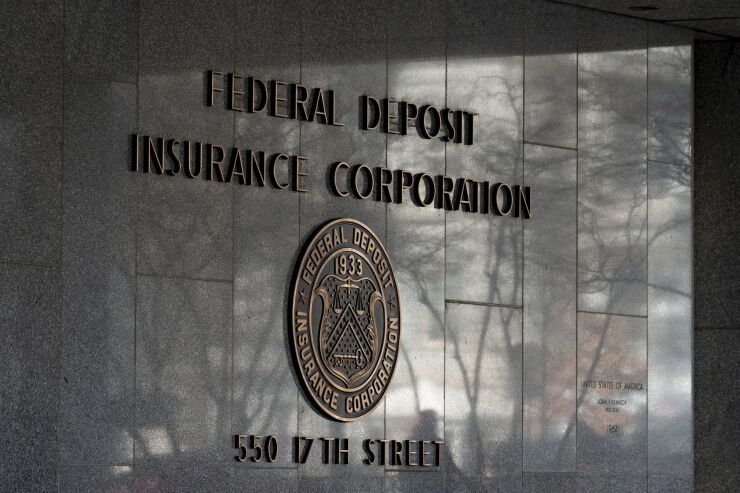WASHINGTON — The banking industry is throwing its weight behind legislation that would eliminate restrictions on brokered deposits and replace them with limits on asset growth for struggling banks.
The bill, introduced by Sen. Jerry Moran, R-Kan., this week, would effectively dismantle Section 29 of the Federal Deposit Insurance Act by striking references to “brokered deposits” and replacing them with “asset growth restrictions.”
Banks have sought to paint the current definition of brokered deposits as overly broad and out of date. The classification has important implications; banks that are not well capitalized face restrictions on accepting brokered funds.
Those restrictions are meant in part to discourage struggling banks from overrelying on brokered deposits to fund overheated growth. But the legislation would aim to limit that growth more directly.

The bill would introduce a new regulatory framework that imposes “maximum levels of growth in average total assets that an insured depository institution that is less than well capitalized may not exceed, and provide appropriate adjustments for growth resulting from corporate restructuring such as acquisitions or mergers,” according to the text.
After Moran's bill was introduced in the Senate, the American Bankers Association, a
“This is a much-needed measure to ensure that banks of all sizes have access to a stable and diverse funding base, and are able to innovate to meet the needs and expectations of their customers,” James Ballentine, executive vice president of congressional relations at the ABA, said in the letter, which was addressed to Moran.
Currently, Section 29 limits the use of brokered deposits among banks that are less than well capitalized. The Federal Deposit Insurance Act was amended in 1989 to include Section 29 and allow the Federal Deposit Insurance Corp. to regulate brokered deposits, which have sometimes been referred to as “hot money” by financial professionals given their
Brokered deposits are generally credited with contributing to the severity of the savings and loans crisis, and several banks that failed in the 2008-2009 mortgage meltdown held abundant amounts of brokered funds.
But the bill and its supporters argue that changes in the modern banking system over the last three decades have eclipsed regulators’ longtime views on the danger of brokered deposits at struggling institutions.
“[T]echnological and demographic developments have changed the way in which depository institutions seek and source deposits, and, as a result, many deposits that are classified as brokered pose little, if any, risk to the deposit insurance system,” the text of the bill states.
The bill would also give the FDIC broad authority to establish looser growth restrictions for banks that are less than well capitalized “if the Corporation finds that such a level will not pose an undue risk to the Deposit Insurance Fund."





